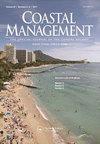The IUU Nature of FADs: Implications for Tuna Management and Markets
IF 1.9
4区 环境科学与生态学
Q4 ENVIRONMENTAL SCIENCES
引用次数: 7
Abstract
Abstract World tuna catches reached 5.2 million metric tons in 2018, more than doubling since the early 1990s, primarily due to the introduction of Fish Aggregating Devices (FADs). The widespread use of drifting FADs has increased the economic efficiency of the fleet by making it easier to aggregate and locate tuna schools, but at a high ecological cost, including: significant catches of juvenile tunas; bycatch of endangered, threatened and protected species; and “ghost fishing,” marine pollution, and sensitive habitat destruction by abandoned FADs. Recent analysis indicates that most deployed FADs are eventually lost, stolen, beached, or abandoned, continuing their destructive impacts. This paper examines the legal regime, market forces, and other factors that frame FAD use. We demonstrate that, because deployed FADs are legally considered to be fishing, when they drift into closed areas or otherwise contravene national or international agreements or regulations, they are Illegal, Unreported, and/or Unregulated (IUU); vessels using such FADs are therefore IUU. We suggest that introducing a transparent FAD ownership tracking system and requiring FAD owners to mitigate their impacts could substantially improve the effectiveness of tuna Regional Fisheries Management Organizations (RFMOs) and redirect market incentives to properly support tuna management.FADs的IUU性质:对金枪鱼管理和市场的影响
摘要2018年,世界金枪鱼捕获量达到520万公吨,自20世纪90年代初以来翻了一番多,这主要是由于鱼类聚集装置的引入。漂流型FAD的广泛使用提高了船队的经济效率,使金枪鱼种群的聚集和定位变得更加容易,但却付出了高昂的生态代价,包括:大量捕获幼年金枪鱼;濒危、受威胁和受保护物种的副渔获物;以及“幽灵捕鱼”、海洋污染和废弃FAD对敏感栖息地的破坏。最近的分析表明,大多数部署的FAD最终都会丢失、被盗、搁浅或被遗弃,继续其破坏性影响。本文考察了FAD使用的法律制度、市场力量和其他因素。我们证明,由于部署的FAD在法律上被视为捕鱼,当它们漂移到封闭区域或以其他方式违反国家或国际协议或条例时,它们是非法、未报告和/或无管制的;因此,使用这种FAD的船只是IUU。我们建议,引入透明的FAD所有权跟踪系统,并要求FAD所有者减轻其影响,可以大大提高金枪鱼区域渔业管理组织的有效性,并重新调整市场激励措施,以适当支持金枪鱼管理。
本文章由计算机程序翻译,如有差异,请以英文原文为准。
求助全文
约1分钟内获得全文
求助全文
来源期刊

Coastal Management
环境科学-环境科学
CiteScore
6.00
自引率
0.00%
发文量
24
审稿时长
>36 weeks
期刊介绍:
Coastal Management is an international peer-reviewed, applied research journal dedicated to exploring the technical, applied ecological, legal, political, social, and policy issues relating to the use of coastal and ocean resources and environments on a global scale. The journal presents timely information on management tools and techniques as well as recent findings from research and analysis that bear directly on management and policy. Findings must be grounded in the current peer reviewed literature and relevant studies. Articles must contain a clear and relevant management component. Preference is given to studies of interest to an international readership, but case studies are accepted if conclusions are derived from acceptable evaluative methods, reference to comparable cases, and related to peer reviewed studies.
 求助内容:
求助内容: 应助结果提醒方式:
应助结果提醒方式:


